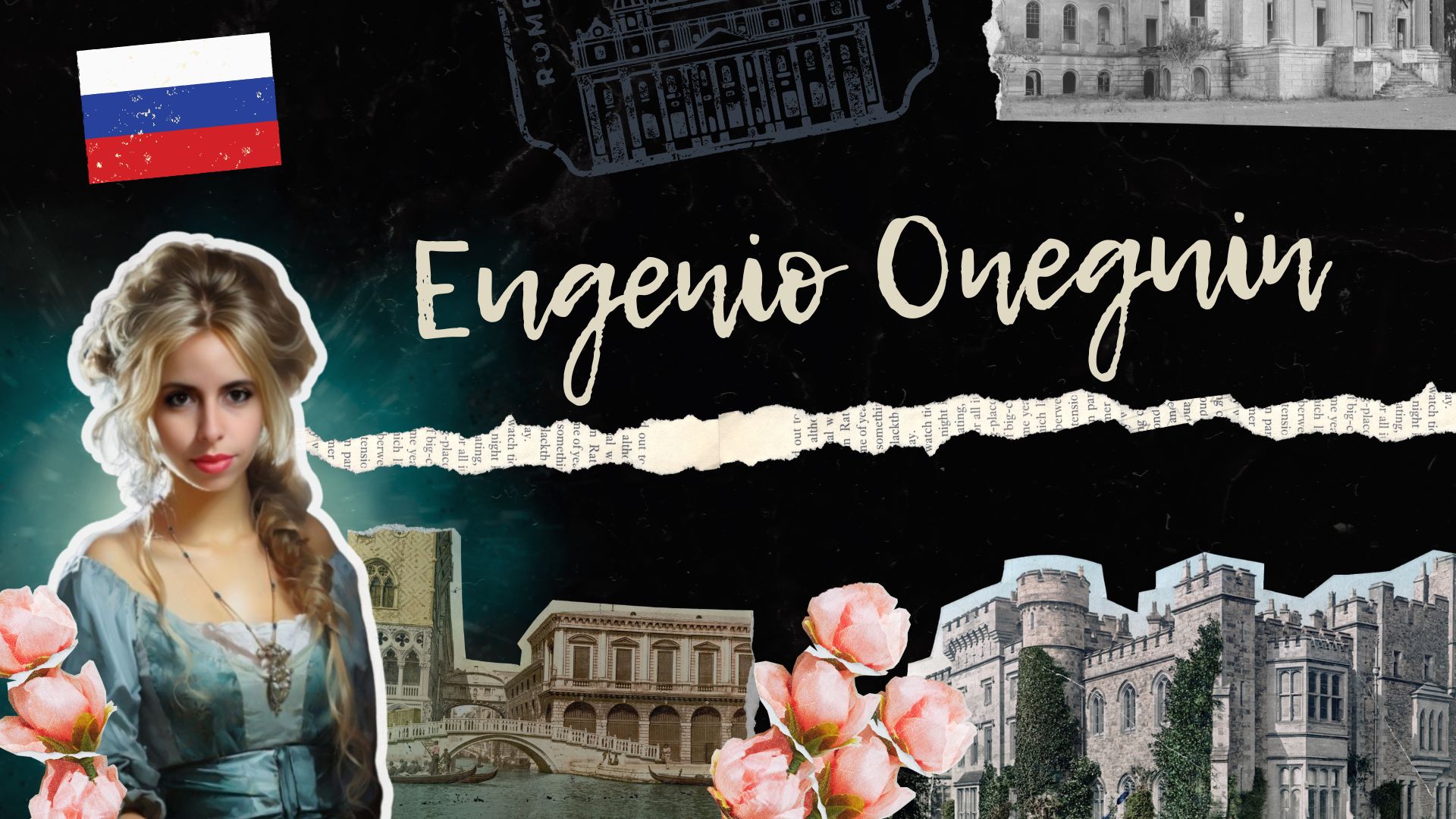
(Cover designed by me in canva editor)
Portada diseñada por mi en el editor de Canva
I finally managed to finish reading this novel that I hadn't read since my teenage years, since high school, a book that I could describe as something like a darker version of Pride and Prejudice hehe 😄 No, don't mind me! I'm just kidding, but the truth is that the atmosphere of this novel reminds me quite a bit of Jane Austen's style in a way. >Finalmente pude terminar de leer esta novela que yo no leía desde la adolescencia, desde que estaba en la secundaria, un libro que yo podría definir algo así como una versión más oscura de Orgullo y Prejuicio jeje 😄 ¡No, no me hagan caso! Estoy bromeando, pero la verdad es que el aura de esta novela me recuerda bastante el estilo de Jane Austen de cierta manera.

Overview/Resumen
Suddenly, the countryside is turned upside down by the arrival of Eugene Onegin, a handsome and arrogant young man from St. Petersburg, who, with his charm and refined manners, manages to enchant everyone around him, especially the sweet and naive Tatyana, a girl who is constantly reading poetry and romantic novels. so when she saw Onegin, she fell in love with him because she idealized him, but to make matters worse, he encouraged that feeling by constantly courting her with gallantries. She was very shy, but one night, encouraged by an idyllic dream, she dared to write a letter to Eugene in which she confessed her feelings, and sent it to him, but he rejected her, albeit with a very tactful speech, because in the stuffy Russian society of the time it was very frowned upon for a girl to take the initiative, breaking the young woman's heart. To make matters worse, during a dance to which his friend Lensky had invited him, Eugene Onegin began to flirt with Olga (Lensky's fiancée and Tatyana's sister), so Lensky challenged him to a duel, and during that duel Onegin mortally wounded his best friend, causing him to leave the countryside, tormented by guilt and sadness. Years later, he returns to the countryside and finds Tatyana again. He falls madly in love with her and tries to woo her, but she, although she still loves him, vehemently rejects him out of dignity and, above all, respect for her husband, who is now home. >De pronto el campo se revoluciona con la llegada de Eugenio Oneguin, un joven guapo y arrogante de San Petersburgo, el cuál con su gracia y modales refinados logra hechizar a todos a su alrededor, en especial a la dulce e ingenua Tatyana, una muchacha que constantemente está leyendo poesía y novelas románticas, así que al ver a Oneguin se prendó de él porque lo idealizó, pero para colmo él fomentó ese sentimiento porque constantemente la cortejaba con galanteos, ella era muy tímida pero en una noche, alentada tras un idílico sueño, ella se atreve a escribir una carta para Eugenio en la cuál le confiesa lo que siente, y se la envía, pero él la rechaza, aunque con un discurso con mucho tacto, porque en la acartonada sociedad rusa de ese entonces estaba muy mal visto que una chica tomara la iniciativa, rompiendo el corazón de la joven. Para colmo, durante un baile al que lo había invitado su amigo Lensky, Eugenio Oneguin se pone a coquetear con Olga (Prometida de Lensky y hermana de Tatyana) de modo que Lensky lo reta a un duelo, y durante ese duelo Oneguin hiere de muerte a su mejor amigo, algo que provocó que él se marchara del campo, atormentado por la culpa y la tristeza. Años después regresa al campo y encuentra a Tatyana nuevamente, se enamora perdidamente de ella y pretende cortejarla, pero ella, aunque aún lo ama, lo rechaza con vehemencia por dignidad y sobre todo respeto a su marido, ya que ahora está casa.
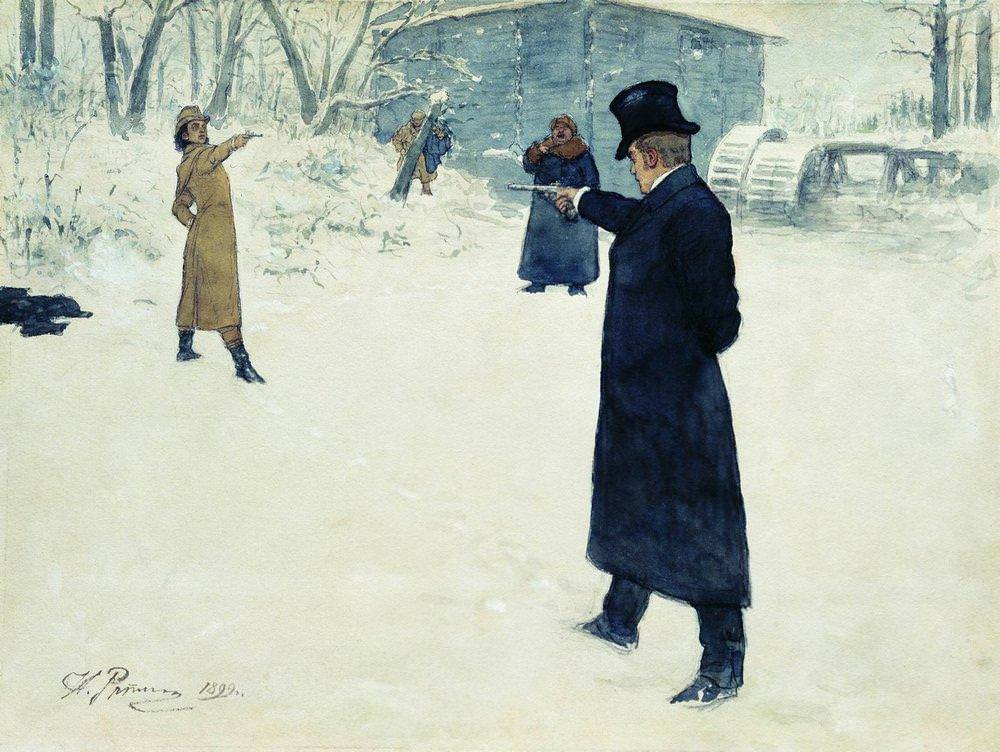
My Opinion/Mi Opinión
This novel, despite its shocking ending, I enjoyed immensely for several reasons, especially because Tatyana ultimately stood up for her dignity. Despite her pain and suffering, she didn't beg or plead for a love that wasn't worth it; she simply moved on. Furthermore, it also speaks to her enormous sense of loyalty, because even though she admits to still being in love with Onegin, she doesn't intend to give in to his advances. After all, he proves to be disloyal by pursuing a married woman, something far more reprehensible than the fact that a girl declared her love as she did, which scandalized him (to put it mildly).
Esta novela, a pesar de su final impactante me gustó muchísimo por varias razones, en especial porque Tatyana al final de cuentas hizo valer su dignidad, a pesar de su dolor y sufrimiento no imploró, no suplicó por un amor que no valía la pena, simplemente siguió adelante, pero además, también habla de su enorme sentido de lealtad, porque a pesar de que reconoce estar enamorada aún de Oneguin, no pretende ceder a sus galanteos, después de todo él demuestra ser desleal al pretender a una mujer casada, algo que es mucho más reprobable que el hecho de que una chica declarara su amor como ella lo hizo y que a él le escandalizó (por llamarlo de alguna manera)
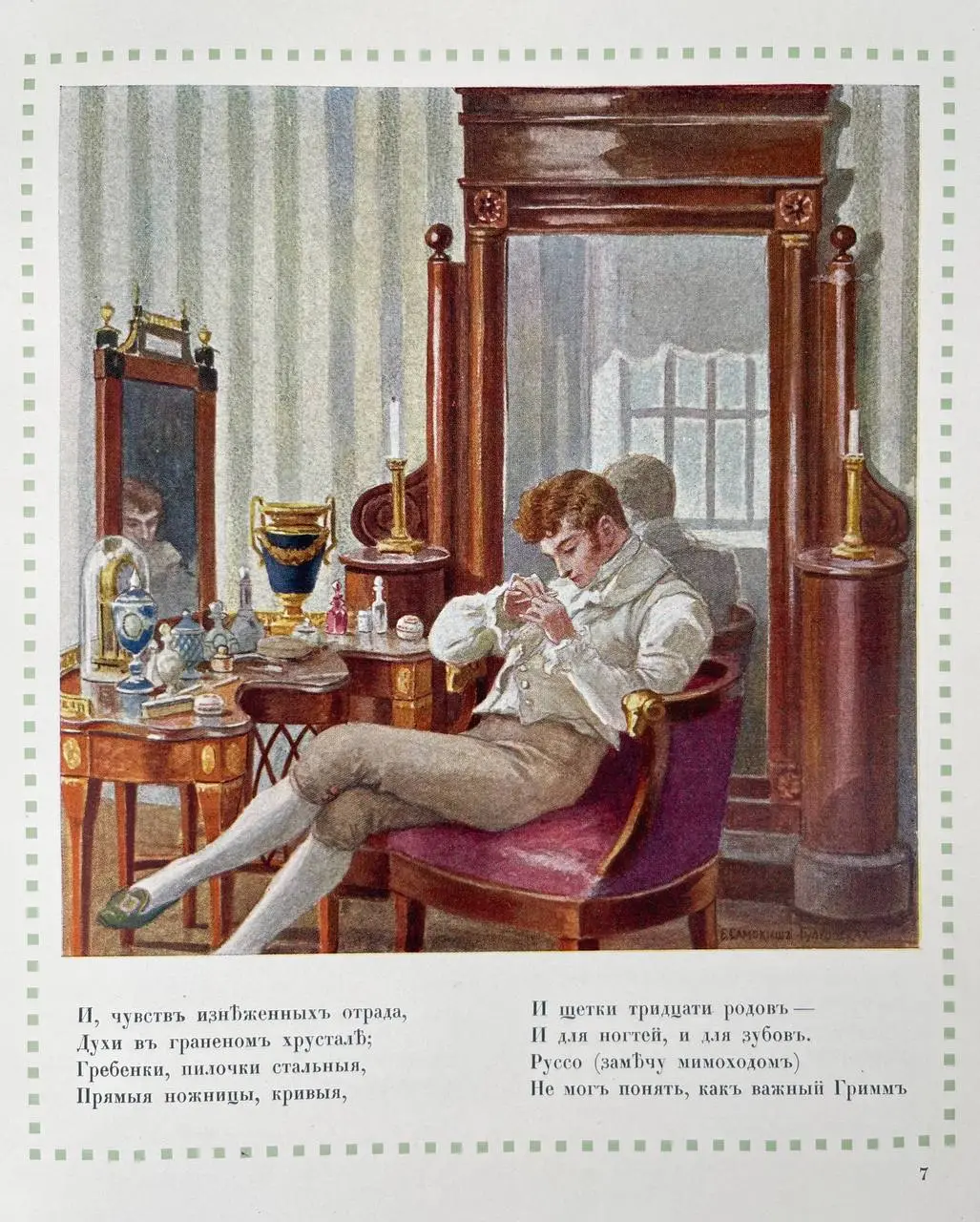
On the other hand, something that really catches my attention is the relationship between fiction and the real world. Life inspires art, doesn't it? We constantly find stories, novels, or paintings inspired by real-life situations, but the reverse also happens: in this case, life was inspired by art, since in the end, Tatyana felt motivated and inspired by the novels she always read, and that ending was truly Shakespearean. However, it also serves as a way to critique the rigid and hypocritical customs of Russian high society, just as Tolstoy did with Anna Karenina. We see, in particular, that women suffered the most from the blows of criticism and judgment, since their role was very defined and had to be characterized by modesty, so anything that deviated from what was considered "normal" was condemned.
Por otra parte hay algo que llama mucho mi atención y es la relación entre la ficción y el mundo real, la vida inspira al arte ¿no es cierto? Constantemente encontramos relatos, novelas o pinturas inspiradas en situaciones de la vida, pero también sucede al contrario, en esta ocasión la vida se inspiró en el arte, ya que al final de cuentas Tatyana se sintió motivada e inspirada por las novelas que siempre leía, y ese final realmente fue muy shakesperiano. Sin embargo también sirve como una forma de criticar las costumbres acartonadas e hipócritas de la alta sociedad rusa, exactamente como hizo Tolstói con Ana Karenina. En especial vemos que era la mujer la que más sufría los embates de las criticas y los juicios, ya que su rol era muy marcado y debía estar caracterizado por recato, así que todo lo que se saliera de lo que se consideraba como "normal" era condenable.
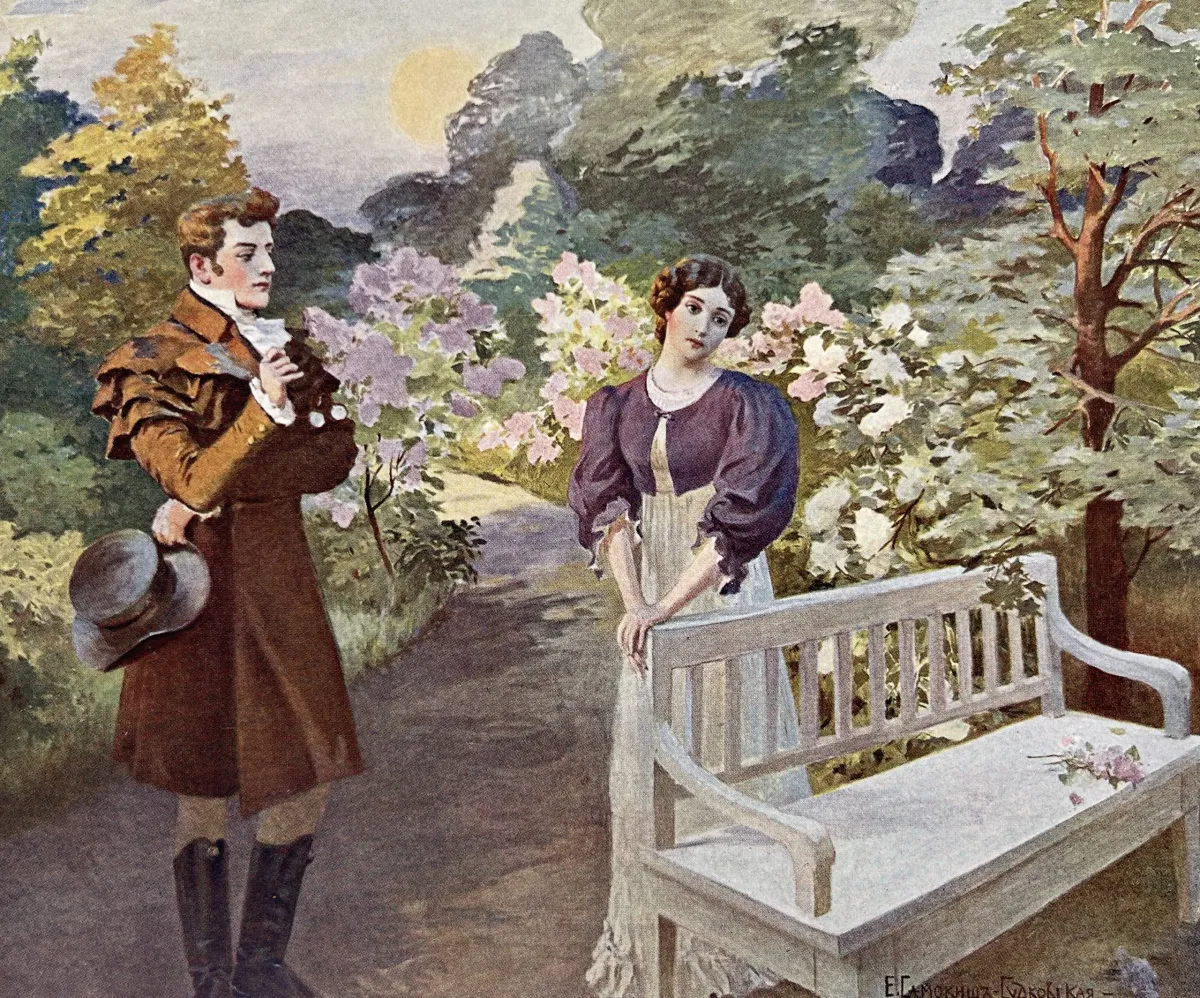
Tatyana's rejection and his adherence to dignity serve to demonstrate that everything in life has consequences, like the butterfly effect. You can't go through life acting unjustly and then pretend nothing happened. I'm not referring to the fact that he rejected Tatyana first; after all, if he didn't love her, it wasn't his fault, was it? We can't force feelings. But what I mean is that Onegin unleashed a true catastrophe by courting her and encouraging the feelings he had already detected in her. Not only that, but he also stirred up his friend's jealousy by flirting with Olga, which led to the fateful duel. You see? Arrogance unleashed jealousy, which wounded pride, and this, in turn, caused death, regret, and desolation.
El rechazo de Tatyana y su apego a la dignidad a su vez nos sirven para demostrar que todo en la vida tiene consecuencias, como el efecto mariposa, no puedes pretender ir por el mundo actuando de una manera injusta y luego pretender que nada ha currido, y no me refiero al hecho de que él hubiese rechazado a Tatyana primero, después de todo, si él no la quería no tenía la culpa de eso, ¿no? No podemos forzar los sentimientos, pero a lo que me refiero es a que Oneguin desató una verdadera hecatombe al cortejarla y alentar los sentimientos que ya había detectado en ella, pero no conforme con eso también desató los celos de su amigo al flirtear con Olga, lo cuál condujo al fatídico duelo, ¿lo ven? : la arrogancia desató los celos que hirieron el orgullo y esto a su vez provocó muerte, arrepentimiento y desolación.
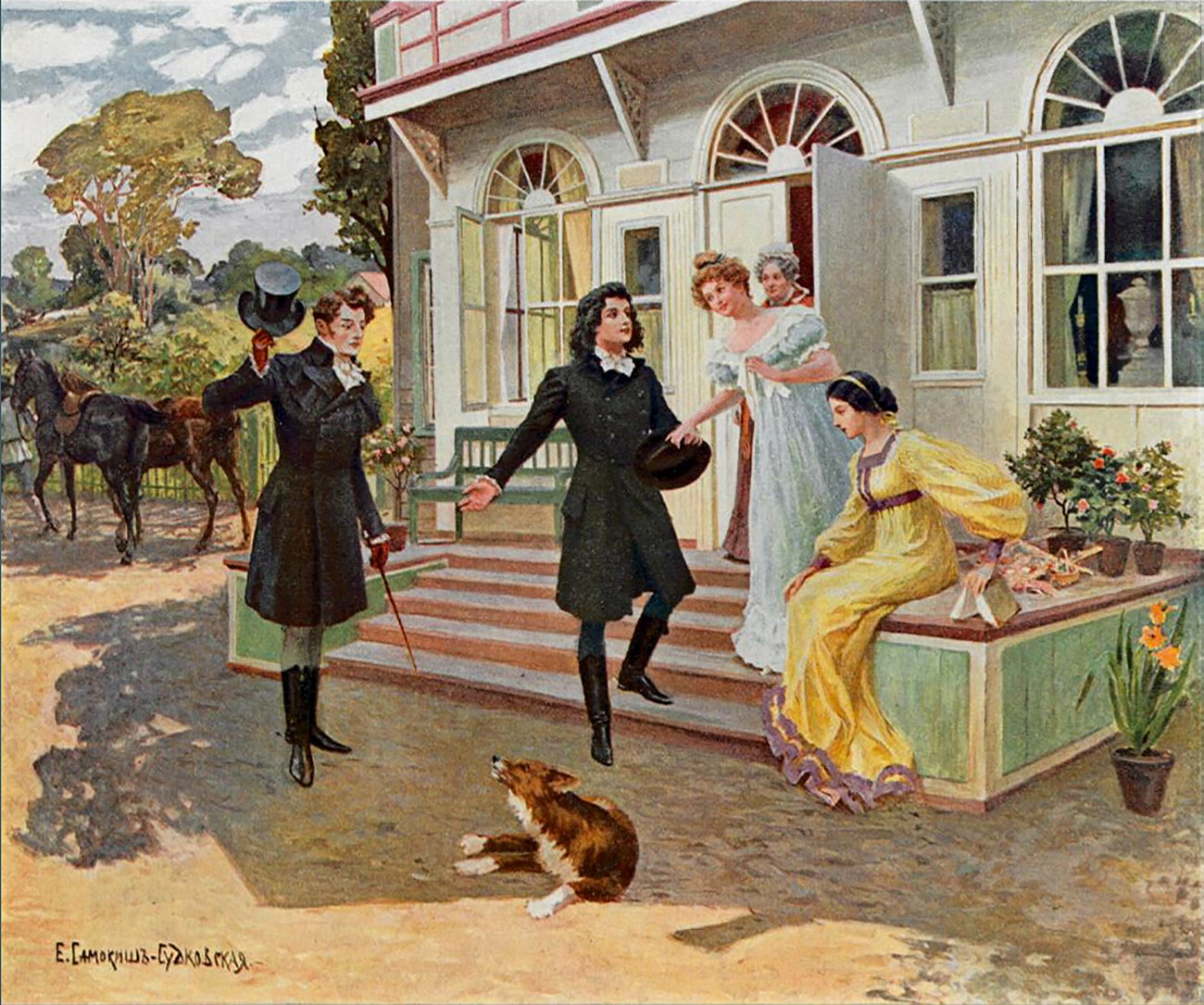
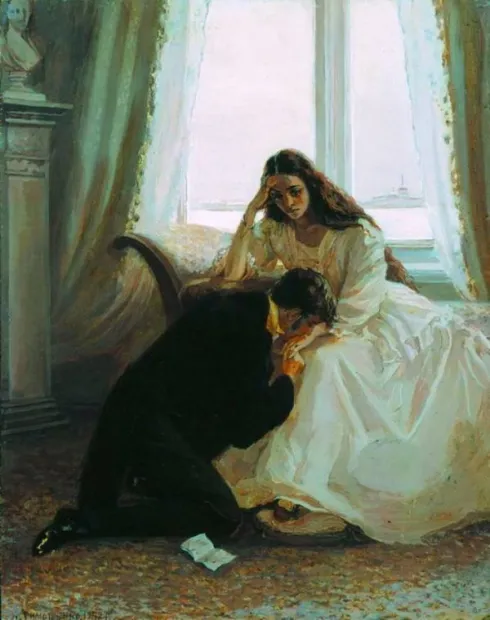
Aleksandr Pushkin knew how to evoke a multitude of emotions in a single novel, much like Jane Austen, so much so that Eugene Onegin has inspired plays, films, operas, and ballets. Its narrative structure is somewhat complex because it's divided into verses, not prose (which might be a bit jarring if you're not used to it), but the story is captivating and you can't put it down, so I highly recommend it.
Aleksandr Pushkin supo como generar demasiadas emociones en una misma novela, tal como lo hacía Jane Austen, tanto que Eugenio Oneguin ha inspirado obras de teatro, películas, operas y Ballets. Su estructura narrativa es un tanto compleja porque está dividida en versos, no en prosa, (si no estás acostumbrado podría resultar un poco chocante) pero aún así la historia te atrapa y no puedes parar de leer, así que la recomiendo totalmente.

(Image designed by me in canva editor)
Imagen diseñada por mi en el editor de Canva.